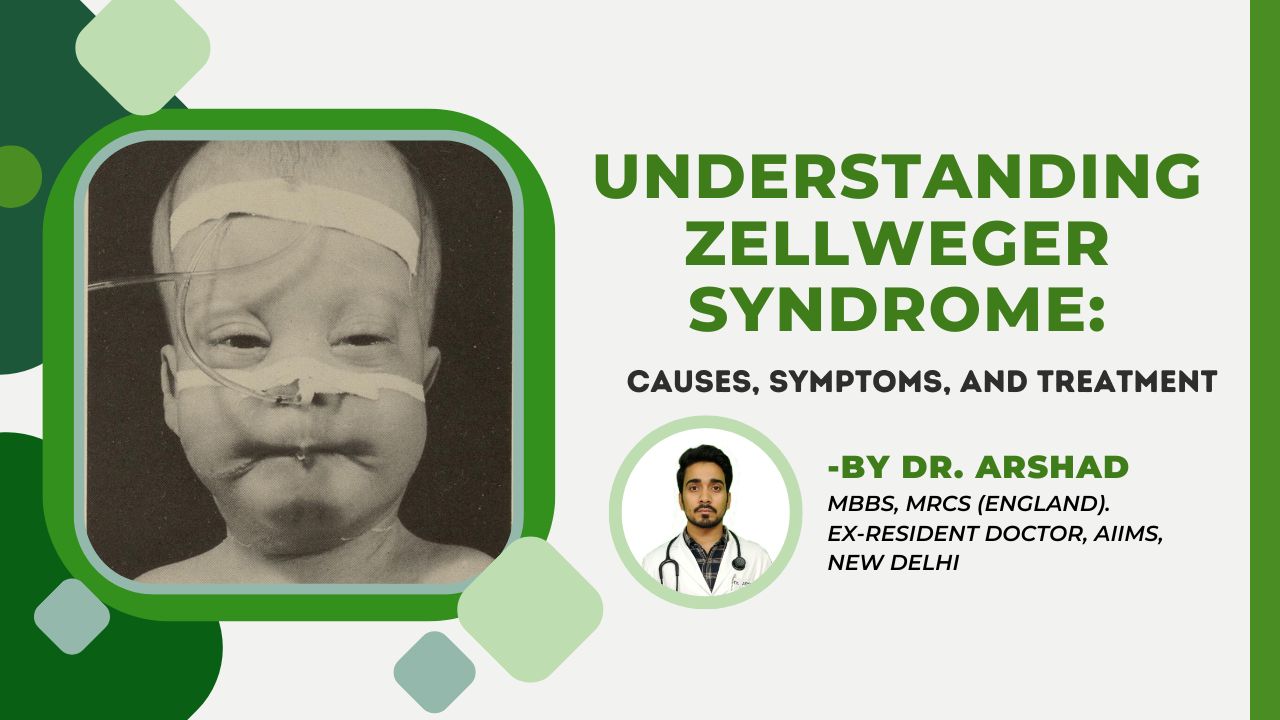Hey, Welcome to my blog drarshad.in. Do you know about this rare disorder? Zellweger Syndrome is a rare, life-threatening genetic disorder affecting 1 in 100,000 newborns. It causes severe developmental delays and organ impairments. Let’s explore its causes, symptoms, and treatment options while providing emotional support for affected families. Together, we can raise awareness and improve understanding of this condition.
What is Zellweger Syndrome?
Zellweger Syndrome is a rare genetic disorder classified as a peroxisome biogenesis disorder. It affects the functioning of peroxisomes, small organelles responsible for various metabolic processes within cells. When peroxisomes don’t work properly, it leads to a range of severe symptoms.
The severity and manifestation of Zellweger Syndrome can vary, but common symptoms include developmental delays, intellectual disability, seizures, hearing and vision impairments, liver dysfunction, and bone abnormalities.
This condition is caused by mutations in PEX genes involved in peroxisomal biogenesis. It follows an autosomal recessive inheritance pattern, meaning both parents must pass on a mutated gene for the child to develop the disease.
Diagnosis involves clinical evaluation and specialized tests such as blood work and imaging.
Ongoing research is dedicated to understanding Zellweger Syndrome better, which may lead to potential therapies in the future. Meanwhile, support and care for individuals and families affected by this condition are essential to navigate the challenges posed by Zellweger Syndrome.
Prevalence and genetic inheritance patterns
Zellweger Syndrome is more prevalent in certain populations like the Amish community and the French-Canadian population.
This autosomal recessive condition requires both parents to carry the mutated gene for their child to develop the syndrome. Zellweger Syndrome belongs to a group of disorders known as peroxisome biogenesis disorders (PBDs), characterized by abnormal peroxisome function or absence.
Peroxisomes are small organelles involved in vital metabolic processes within cells.
Genetic counseling plays a crucial role in educating families about the risks associated with the condition and assisting them in making informed decisions when planning a family.
By understanding the genetic basis and prevalence of Zellweger Syndrome, we can emphasize the importance of early diagnosis and appropriate genetic counseling for affected families.
Causes and Genetic Factors of Zellweger Syndrome
Zellweger Syndrome is a rare inherited disorder that affects multiple organ systems. It is caused by mutations in any of the 13 PEX genes, responsible for producing peroxisomes – small organelles involved in various metabolic processes.
When functional peroxisomes are lacking, toxic substances accumulate within cells and tissues, causing damage and dysfunction. The condition follows an autosomal recessive pattern, meaning affected individuals inherit two copies of the mutated gene (one from each parent).
For parents to pass on Zellweger Syndrome, both must carry at least one copy of the mutated gene. Consequently, each pregnancy carries a 25% chance of the child having the syndrome.
While most cases occur sporadically without warning signs or a family history, families with a previously affected child can undergo genetic counseling to assess their carrier status and the risk for future pregnancies.
Understanding the genetic basis of this devastating disease emphasizes the significance of early diagnosis through newborn screening programs and ongoing research for more effective treatments.
Signs and Symptoms of Zellweger Syndrome
Typically, it is diagnosed in infancy, and its symptoms can be devastating.
Here is a list of various symptoms associated with Zellweger Syndrome:
- Enlarged liver (hepatomegaly) leading to abdominal swelling.
- Weak muscle tone (hypotonia) causing feeding difficulties and delayed development.
- Vision impairment or blindness (retinal damage) with nystagmus and cataracts.
- Hearing loss.
- Seizures.
- Respiratory difficulties (apnea, irregular breathing).
- High blood acid levels (hyperpipecolic acidemia).
- Bone abnormalities (curved spine, hip dislocation).
Enlargement of the liver, leading to abdominal swelling or discomfort, is a common sign of Zellweger Syndrome. Babies with this condition often have weak muscle tone (hypotonia), which can make feeding difficult and cause delays in reaching developmental milestones.
Vision impairment or blindness is another prominent symptom, resulting from damage to the retina. This can manifest as involuntary eye movements (nystagmus), clouding of the lens (cataracts), and other visual abnormalities.
Additional symptoms may include hearing loss, seizures, respiratory difficulties like apnea or irregular breathing, high levels of acid in the blood (hyperpipecolic acidemia), and bone abnormalities such as a curved spine or hip dislocation.
It’s important to note that not all individuals with Zellweger Syndrome will exhibit these exact symptoms. However, if your child experiences several unexplained health concerns early in life, it is advisable to consult a healthcare provider for a proper diagnosis and exploration of treatment options.
Diagnosis and Screening of Zellweger Syndrome
Diagnosing Zellweger Syndrome can be a complex and challenging process for doctors. Since the symptoms of this condition can overlap with those of other disorders, accurately identifying Zellweger Syndrome requires careful evaluation and multiple tests.
This allows doctors to gather important information about the individual’s symptoms and overall health.
To further aid in the diagnosis, various tests are conducted. Blood tests may be performed to analyze specific markers or assess the levels of certain substances in the bloodstream. Urine tests can provide additional insights into metabolic abnormalities. Imaging studies, such as MRI or CT scans, may be utilized to evaluate the structure and function of organs, looking for any potential abnormalities that could indicate Zellweger Syndrome.
Genetic testing plays a critical role in diagnosing Zellweger Syndrome. This test examines specific genetic mutations associated with the condition. If one or more of these mutations are identified, a diagnosis of Zellweger Syndrome is typically confirmed.
Prenatal testing offers an opportunity for screening Zellweger Syndrome before birth. This involves analyzing cells from amniotic fluid or chorionic villus sampling (CVS) to identify genetic abnormalities in the developing fetus.
Early detection through prenatal screening or newborn testing is crucial as it allows parents to plan for appropriate care and treatment options following birth.
Treatment and Management of Zellweger Syndrome
There is presently no treatment for Zellweger Syndrome. Treatment approaches for Zellweger Syndrome focus on addressing specific symptoms as they arise. For example, anticonvulsant medications may be prescribed to manage seizures, while a gastrostomy tube (feeding tube) may be utilized to assist with feeding difficulties caused by muscle weakness.
Supportive care plays a crucial role in managing Zellweger Syndrome. Physical therapy and occupational therapy can help improve mobility and promote independence.
It is essential to collaborate closely with healthcare providers and specialists experienced in treating Zellweger Syndrome. They can provide tailored treatment recommendations based on an individual’s unique needs.
While a cure remains elusive, ongoing research and advancements in genetic testing offer hope for the future. Continued efforts in understanding and managing this rare condition may lead to improved therapies and outcomes for those affected by Zellweger Syndrome.
Emotional and Practical Support of Zellweger / Syndrome
Emotional and practical support is vital for families coping with the challenges of Zellweger Syndrome. This rare genetic disorder often leads to severe disabilities, making everyday tasks difficult. Therefore, having a support network that understands the unique demands of caring for someone with Zellweger Syndrome is crucial.
Joining support groups or connecting with other families facing similar challenges can provide emotional support and practical advice on managing daily life. Support groups provide a safe space for seeking guidance and understanding from others who have firsthand experience with Zellweger Syndrome.
By accessing these support networks, families and caregivers can find emotional and practical support, making their experience with Zellweger Syndrome more manageable and improving the overall well-being of those affected by the condition. Exploring government assistance programs and private charitable organizations can provide valuable assistance.
Keeping informed about advancements in medical research provides additional emotional support and the potential for improved treatment options and care management strategies. While living with Zellweger Syndrome presents significant challenges, a supportive community can make a meaningful difference in navigating this complex journey.
Also read: Understanding Bronze Baby Syndrome: A Comprehensive Guide
Research and Future Directions of Zellweger Syndrome
Ongoing research on Zellweger Syndrome aims to advance our understanding of the disease and identify potential treatments.
Gene therapy involves introducing healthy genes to replace or repair the defective ones in the patient’s cells.
Stem cell transplantation involves replacing damaged cells with healthy ones from a donor, potentially improving liver function in some patients.
Drug therapies are being investigated to address specific symptoms like seizures and vision loss.
Researchers are also studying the molecular mechanisms of Zellweger Syndrome to identify new targets for intervention.
While effective treatments for Zellweger Syndrome are still being developed, ongoing research provides hope for improving outcomes and finding ways to better manage this rare disorder.
Conclusion
Zellweger Syndrome is a rare genetic disorder that disrupts the body’s ability to metabolize fatty acids, leading to severe health complications. However, early diagnosis through genetic testing and screening can enable better management and improve the quality of life for affected individuals.
Ongoing research into the underlying causes of Zellweger Syndrome offers hope for future treatments and potentially a cure. This emphasizes the importance of continued scientific investigation and funding to advance our understanding of the disease.
In the absence of a cure, emotional and practical support plays a vital role. Healthcare providers, family members, and support groups can provide invaluable assistance, ensuring individuals with Zellweger Syndrome receive the care they need.
Raising awareness about Zellweger Syndrome is essential for promoting early diagnosis, implementing effective management strategies, and providing access to supportive care options.
Frequently Asked Questions (FAQs):
1. What Is Zellweger Syndrome?
Zellweger Syndrome is a rare genetic disorder that affects multiple organ systems, leading to severe developmental delays and organ impairments.
2. Is Zellweger Syndrome Curable?
Presently, there is no cure for Zellweger Syndrome. Treatment options are focused on managing symptoms and providing supportive care.
3. Can Zellweger Syndrome Be Detected Before Birth?
Yes, prenatal screening can detect the presence of certain genetic mutations associated with Zellweger Syndrome.
4. Are There Any Ongoing Research Or Treatment Developments For Zellweger Syndrome?
Yes, research is ongoing to better understand the condition and develop potential treatments, such as gene therapy and drug therapies, to improve outcomes for individuals with Zellweger Syndrome.
5. Are There Any Treatments Available For People With Zellweger Syndrome?
Treatment focuses on managing symptoms and providing supportive care such as special diets or medications to manage seizures or other medical issues.
6. What Are Some Common Signs And Symptoms Of Zelleger’s Syndrome?
Common symptoms include developmental delays, poor muscle tone, vision problems, hearing loss etc.
7. What Kind Of Specialist Should I See If My Child Has Been Diagnosed With Zelleger’s Syndrome?
A pediatrician will usually refer you to specialists who have experience treating children with metabolic disorders like neurologists or ophthalmologists.
8. How Long Do People With Zelleger’s Syndrome Typically Live?
The life expectancy for a baby born with zelleger’s syndrome varies widely but it generally ranges from months up to early childhood years.
9. Is It Possible To Pass Down Zelleger’s Syndrome Through Family Generations?
Yes! It is passed down genetically when both parents carry an abnormal gene responsible for causing the disorder
10) Is Zellweger Syndrome Preventable?
Since Zellweger Syndrome is a genetic disorder, it cannot be prevented. However, genetic counseling can help families understand their risk and make informed decisions.
Have a Doubts? Book Online Consultancy.
If You are having any doubt then you can book a free online consultancy directly with me, and I will surely guide you. I am Dr. Arshad – MBBS, MRCS ( England ). Just let me know and I will do everything possible to solve your doubts or will guide you.




